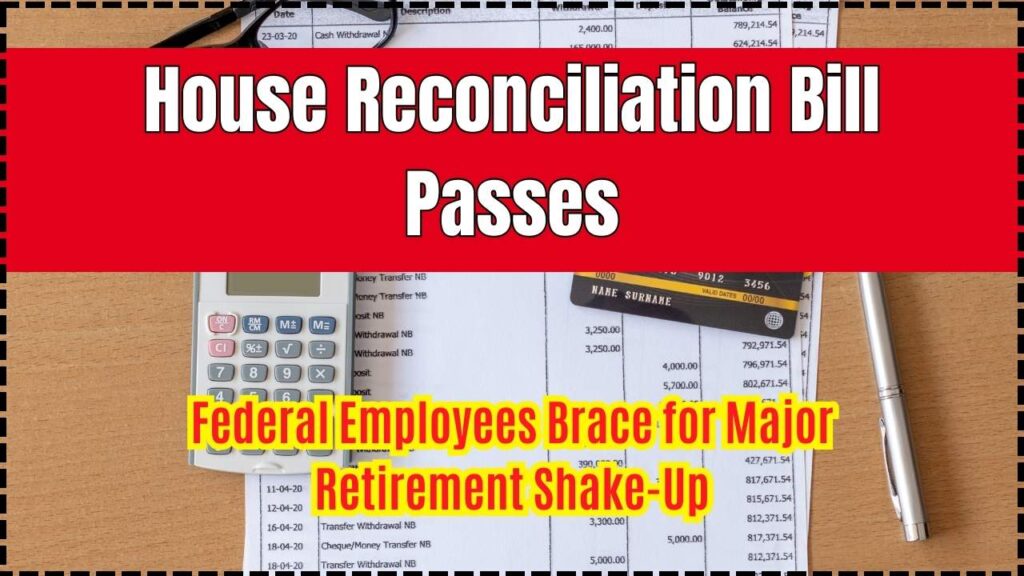
House Reconciliation Bill Passes: In a narrow 215–214 vote, the U.S. House of Representatives has passed the “One Big Beautiful Bill Act” (H.R. 1), introducing significant changes to federal employee retirement benefits. The legislation now moves to the Senate for further consideration.
House Reconciliation Bill Passes
The passage of the House reconciliation bill marks a significant shift in federal employee retirement benefits, introducing changes that will affect both current and future employees. As the bill moves to the Senate, federal workers should stay informed and proactively plan for these potential adjustments to their retirement and employment terms.
| Provision | Details | Effective Date |
|---|---|---|
| Elimination of FERS Annuity Supplement | Removes the supplement bridging early retirement and Social Security eligibility | January 1, 2028 |
| “High-5” Annuity Calculation | Proposal to change annuity calculation from highest 3 years to highest 5 years was removed | N/A |
| New Hire Retirement Options | New employees choose between: 1) 4.4% FERS contribution rate with at-will employment; or 2) 9.4% FERS contribution rate with civil service protections | Upon hiring |
| MSPB Appeal Fee | Introduces a $350 fee for filing appeals with the Merit Systems Protection Board; refunded if appeal is successful | Upon enactment |
| FEHB Program Audit | Mandates an audit of enrollees in the Federal Employees Health Benefits program to ensure eligibility compliance | Upon enactment |
Understanding the Changes
Elimination of FERS Annuity Supplement
The Federal Employees Retirement System (FERS) annuity supplement currently provides additional income to federal employees who retire before age 62, bridging the gap until they become eligible for Social Security benefits. Under the new legislation, this supplement will be eliminated starting January 1, 2028. However, employees who are already receiving the supplement or become eligible before this date will not be affected.
“High-5” Annuity Calculation Proposal Removed
A proposal to change the annuity calculation from the highest three years of salary (“high-3”) to the highest five years (“high-5”) was initially included in the bill but was removed before the final House vote. This change would have potentially reduced retirement benefits for many employees.
New Hire Retirement Options
New federal employees will be required to choose between two options:
- Maintain the current 4.4% FERS contribution rate but accept at-will employment status, forfeiting traditional civil service protections.
- Retain civil service protections but increase their FERS contribution rate to 9.4%.
This change aims to provide flexibility in employment terms but may impact job security and retirement planning for new hires.
MSPB Appeal Fee
The bill introduces a $350 fee for current and former federal employees, as well as job applicants, to file an appeal with the Merit Systems Protection Board (MSPB). Those who win their appeals will be refunded the fee.
FEHB Program Audit
An audit of enrollees in the Federal Employees Health Benefits (FEHB) program is mandated to ensure eligibility compliance.
Practical Advice for Federal Employees As House Reconciliation Bill Passes
Given these impending changes, federal employees should consider the following steps:
- Review Retirement Plans: Assess how the elimination of the FERS annuity supplement may impact your retirement timeline and financial needs.
- Consult Financial Advisors: Seek guidance from certified financial planners to navigate the new retirement options and understand the implications of increased FERS contributions.
- Stay Informed: Keep abreast of legislative developments as the bill moves to the Senate, as further amendments may occur.
- Evaluate Employment Terms: For new hires, carefully consider the trade-offs between at-will employment and higher FERS contributions with civil service protections.
Federal Retirement Cuts Approved: What the House’s New Bill Means for Government Workers
GOP Tax Bill Contains a Quiet Threat to Federal Workers; Could This Be the End of the Civil Service?
Double Social Security Checks in May? Here’s Why You’re Getting Paid Twice
Frequently Asked Questions (FAQs)
Q1: Who will be affected by the elimination of the FERS annuity supplement?
A1: Federal employees who retire on or after January 1, 2028, and are not already receiving the supplement or eligible before this date will be affected.
Q2: What does at-will employment mean for new federal hires?
A2: At-will employment allows employers to terminate employees at any time without cause, and employees can also leave without notice. This status removes traditional civil service protections.
Q3: Will current federal employees have to choose between at-will employment and increased FERS contributions?
A3: No, this provision applies only to new federal employees hired after the enactment of the bill.
Q4: How can I appeal a decision to the MSPB under the new fee structure?
A4: You can file an appeal with the MSPB by paying the $350 fee. If your appeal is successful, the fee will be refunded.
Q5: What is the purpose of the FEHB program audit?
A5: The audit aims to ensure that all enrollees in the FEHB program meet eligibility requirements, maintaining the integrity and sustainability of the program.











